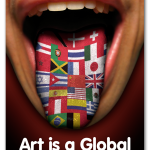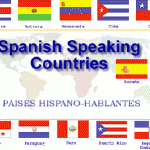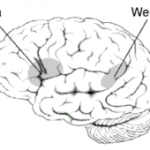blog-1
now browsing by tag
Blog-1
I am the daughter of two non-Native English speakers who had just come to the United States only a couple of years before I was born. As a result, I grew up with Spanish as my first language, and did not attain English as a language until I began to go to school. Everytime I would be with my parents I knew to speak Spanish, and everytime I was at school I knew it was time to bust out my English. I do not quite remember ever thinking that it was difficult balancing both languages. As a kid, I learned to speak both and use them accordingly. What I do recall from my childhood was translating English to Spanish constantly either during parent-teacher conferences or even informal occasions like asking someone for help at the store. This became a habit for me, and I truly believe it helped me internalize and consider both of these languages my “first languages.”
Now, even though both of my parents have learned English, Spanish is the primary language spoken at home. The burden for me now is that I get so accustomed to only speaking English while I am away at school, that when I come back home with my parents I sometimes have trouble finding the right words to say. I’d like to think that I’m not losing my Spanish speaking abilities, since it is my first language, but that it’s just a lack of practice that is making me mess up.
Although I’d say English is my stronger language now, I definitely have the competence in Spanish that allows me to always know when something sounds wrong or right without having to know all the technical grammar there is to the language. I saw the difference there is between knowing a language all your life to learning a new second language when I took a beginning Hebrew course. I had so much trouble grasping the language (given, Hebrew is read right to left and includes a whole new alphabet) and even though I would practice religiously and try to memorize the letters and sounds, I could never know when something did not sound right as I do in Spanish or English. Of course, with a vast amount of practice and commitment to learning Hebrew, I would probably have attained this skill, but definitely not to the extent of someone who grew up with Hebrew as their first language.
Although balancing Spanish and English took extra effort growing up (working as my parents’ personal mini-translator was hard work), I consider myself lucky to be bilingual. It’s great knowing that children are able to soak up multiple languages just by being exposed to them as they grow up and that with the right use and practice, these languages could be used competently for the rest of their lives.
Blog 1
Language has been a part of humans live since their existence. From the cave time till today people found it a necessity to be able to communicate with one another. Whether to convey ideas and feelings, discuss complex subject, or if it was only to pass the time in ideal chat, humans considered language to be a very important part of their daily life. Language for humans is not only a way of communication, it is also a way of social interaction, it is a reflection of the environment, culture and religion of the user and it is a part of that humans’ identity.
For me whether it was the TV, family members or friends, I have grown up hearing different languages and dialects of languages. This experience has constantly piqued my interest in the subject of language. Whenever I heard someone speaking in a different tongue, I always wondered and asked myself many questions such as, why do not we all speak one language? What is the origin of language? Or, how was language spread to the point it now has its own geographical borders?
As a young girl who was born in Kuwait for a Palestinian father and a Jordanian mother, I have always noticed this significant difference in the way my mother and father used the language, or in the way my friends at school talked to me. Although they all were speaking Arabic, every one of these groups used a different dialect. It was explained to me, since a very young age, that people who lived in different places spoke differently. It was an amazing fact that still makes me think till this day.
As I grow up, I have started to notice languages even more. I would sometimes flip the channels on the TV just to listen to people speaking French on some film, hear Spanish from the actors of that Mexican soap opera, or try to understand German on that sports show. For me, I have seen this as a fun activity that I can do all day long.
When I started going to college, my activity turned into insatiable hunger. I want to understand the reason of my fascination with the subject of language. I want to find a reasonable, sensible answer to my many questions but most of all, I want to understand and be able to communicate with as many people as possible. I moved to the United States and leaned English. I have taken French, and German classes and I am still planning to learn Spanish and Russian in the near future.
Language was never a burden to me. Learning a new language is always fun. Whenever I learn a new word, a feeling a clarity and understanding increases in my heart. Whenever I read an article in a foreign language and I realize that I understood what it said unconsciously I start to smile. Learning languages is what makes me happy.
English, Speaking
I definitely grew up in an English-speaking household. English was the only language really spoken under my parents’ roof, to the point where my first personal experience with foreign language was Spanish class, freshmen year of high school. There was no malice attached to our household monolingualism. In fact, I’m unsure what brought it on. Perhaps my parents were too busy raising six kids or thought other languages should be learned later. Maybe they just didn’t think about it. Regardless, English stood out as a priority. My mother, an English major, pushed me to explore literature, starting with children’s books. As I read, Hop on Pop and Go Dog Go gave way to A Series of Unfortunate Events and Artemis Fowl. J.K. Rowling, Joseph Delaney, Blue Balliet were usurped by Douglas Adams, Stephen King, Kurt Vonnegut. By late middle school I realized that I loved English. Learning the conventions of proper English as well as how people actually used the language encouraged me to explore how it could be manipulated to persuade, to tell a story or just for fun.
The room for interpretation in the English language has fascinated me for different reasons at different points in my life. For a long time, puns were the the highest form of future in my eyes. Alice in Wonderland and The Phantom Tollbooth, along with dozens of other books, comics and jokes using the same device were my favorite. Though I still incorporate this sort of wordplay into my own sense of humor, I’ve also learned of how it can be a powerful writing tool. AP Literature and Composition is where I first really started experimenting. Wiggle room in meaning, intentional or otherwise, in a person’s work could lead to vastly different, even conflicting, interpretations of the same passage. You could make the founding fathers, for example, say anything you wanted by casting their words in a different light. This is the sort of thing that I like to look at in language.
Unfortunately, I’ve yet to profoundly familiarize myself with any language other than English. The understanding of Spanish I gained from the three years spent studying it in high school has degraded to the point where it is barely rudimentary. I could blame the shoddily constructed language program at my school or my first Spanish teacher’s disinterest in the class, but overall I didn’t apply myself. I wasn’t interested at the time and the teaching style didn’t encourage development. That said, the ground level knowledge I gained and Spanish and English’s shared Latin roots make it possible for me to communicate basic ideas in Spanish. This was particularly useful in a recent trip to Mexico, where I found that some of what I’d learned came back to me intuitively.
In the future, I hope to learn at least a couple of other languages. Sticking to one language seems like clinging to one mindset or lens for viewing the world. Whole civilizations of culture and literature are unavailable to me as someone who only speaks English, and I hope to remedy that as much as I’m able.




 D5 Creation
D5 Creation